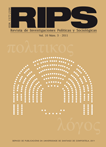“Intención de voto y la evaluación de los candidatos: los jóvenes mexicanos en 2018
Contenido principal del artículo
Resumen
Por muchos años, la teoría de la modernización prevaleció como la principal explicación del abstencionismo mexicano, sin embargo, este enfoque ha sufrido importantes reveses teóricos y empíricos, lo que propició la búsqueda de nuevas explicaciones. Entre las nuevas propuestas, se encuentra la posibilidad de que los mexicanos voten menos porque no encuentran candidatos aceptables ya sea en una evaluación pragmática (experiencia profesional/laboral) o moral, pero no hay prueba empírica de ello y la evidencia internacional tampoco es concluyente al respecto. Aprovechando la elección 2018 se levantó una encuesta para poner a prueba esta hipótesis, encontrándose que aun controlando un par de factores (apego partidista y creencia en que se debe votar aun si los candidatos son malos), la mala evaluación de los candidatos sí se relaciona con el abstencionismo. Además, se encontró que la dimensión moral de este juicio a los candidatos se relaciona más con la tendencia a votar que otros aspectos como la formación académica y profesional del candidato o sus propuestas y equipo de trabajo. Finalmente, esta tendencia parece fluctuar entre ciudades, habiendo regiones donde el peso de lo moral prevalece, mientras que en otras lo profesional y académico determina más el abstencionismo.
Palabras clave:
Detalles del artículo
Artículos más leídos del mismo autor/a(s)
- Héctor Gutiérrez Sánchez, Explicando el voto en Querétaro, México: teorías clásicas y sentimientos , RIPS: Revista de Investigaciones Políticas y Sociológicas: Vol. 21 Núm. 2 (2022)







